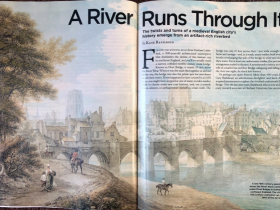News
Terrawatch: why has the Earth’s spinning inner core slowed down?
The Guardian, 22 February 2023
www.theguardian.com/science/2023/feb/22/terrawatch-earth-spinning-inner-core-slowed-down
The solid inner core is contained within the liquid outer core, enabling it to rotate differently from the Earth itself
READ ARTICLE AT The Guardian
Is it greener to use gas or electricity to heat your home and cook?
New Scientist, 14 February 2023
www.newscientist.com/article/2359445-is-it-greener-to-use-gas-or-electricity-to-heat-your-home-and-cook/
An analysis of carbon emissions caused by gas and electric cooking and heating in 25 countries finds that the climate-friendly choice depends on where you are
READ ARTICLE AT New Scientist
Geological impact of Turkey-Syria earthquak slowly comes into focus
The Guardian, 10 February 2023
www.theguardian.com/world/2023/feb/10/geological-impact-of-turkey-syria-earthquake-slowly-comes-into-focus
Subsidence has caused flooding, while hillsides are at risk of landslip, which mean roads may need to be rerouted and people rehomed
READ ARTICLE AT The Guardian
Could putting the clock forward help tackle the climate crisis?
The Guardian, 2 February 2023
www.theguardian.com/news/2023/feb/02/could-putting-clock-forward-help-tackle-climate-crisis
Study suggests tool could be used to reduce energy needs for heating and cooling office buildings
READ ARTICLE AT The Guardian
Terrawatch: Santorini watchful as nearby volcano is monitored
The Guardian, 25 January 2023
www.theguardian.com/science/2023/jan/25/terrawatch-santorini-braces-as-explosive-volcano-stirs
Kolumbo, just off Greek island, could trigger tsunami when it next erupts
READ ARTICLE AT The Guardian
The mysterious underwater avalanches reshaping Earth
New Scientist, 24 January 2023
www.newscientist.com/article/mg25734230-200-the-mysterious-underwater-avalanches-reshaping-earth/
Turbidity currents are cascades of sediment that tumble down Earth’s 9000 submarine canyons carrying carbon, plastics and pharmaceuticals into the deep sea. We are finally learning just how often these dramatic events occur.
READ ARTICLE AT New Scientist
2022 Tonga eruption means we may hit 1.5 degrees of global warming earlier
New Scientist, 12 January 2023
www.newscientist.com/article/2354559-2022-tonga-eruption-means-we-may-hit-1-5c-of-global-warming-earlier/
The massive eruption of a Tongan volcano in January 2022 has made it more likely that we will exceed 1.5°C of global warming within the next five years, but the effect will disappear by 2035
READ ARTICLE AT New Scientist
Climate cooling effect of volcanoes is bigger than we thought
New Scientist, 10 January 2023
www.newscientist.com/article/2354048-climate-cooling-effect-of-volcanoes-is-bigger-than-we-thought/
Analysis of sulphate particles in a Greenland ice core suggests we have underestimated the impact of volcanoes, and overestimated the contribution of anthropogenic sources
READ ARTICLE AT New Scientist
Whistles, cracks, hisses: the noises of the northern lights
The Guardian, 5 January 2023
www.theguardian.com/news/2023/jan/05/noises-of-the-northern-lights-weatherwatch
Study finds some strong auroras are accompanied by noises from changes in the atmosphere
READ ARTICLE AT The Guardian
Terrawatch: the rise and bigger rise of Mediterranean sea levels
The Guardian, 28 December 2022
www.theguardian.com/science/2022/dec/28/terrawatch-the-rise-and-bigger-rise-of-mediterranean-sea-levels
Study shows sea level rise on Amalfi coast over last 20 years is twice that on Costa del Sol
READ ARTICLE AT The Guardian
Venice may get a temporary respite from rising seas by 2035
New Scientist, 6 December 2022
www.newscientist.com/article/2350173-venice-may-get-a-temporary-respite-from-rising-seas-by-2035/
High winter sea levels in Venice are linked to warmer sea surface temperatures in the North Atlantic Ocean, and cooling in that ocean over coming decades should therefore temporarily compensate for the city’s sea level rise
READ ARTICLE AT New Scientist
Weatherwatch: the man who classified the clouds
The Guardian, 1 December 2022
www.theguardian.com/news/2022/dec/01/weatherwatch-the-man-who-classified-the-clouds
Before Luke Howard’s cloud naming scheme, clouds were thought to be too changeable to be classified
READ ARTICLE AT The Guardian
Terrawatch: storms can cause landslides days later, scientists find
The Guardian, 23 November 2022
www.theguardian.com/science/2022/nov/23/terrawatch-storms-can-cause-landslides-days-later-scientists-find
Changes in atmospheric pressure can set soils in motion hours or even days after heavy rain
READ ARTICLE AT The Guardian
Landslides can be triggered by small changes in atmospheric pressure
New Scientist, 16 November 2022
www.newscientist.com/article/2347294-landslides-can-be-triggered-by-small-changes-in-atmospheric-pressure/
We knew earthquakes and heavy rain could initiate landslides, but now it seems alterations in atmospheric pressure can do it too if combined with certain conditions on the ground
READ ARTICLE AT New Scientist
Scientists zap clouds with electricity to make them rain
The Guardian, 3 November 2022
www.theguardian.com/news/2022/nov/03/scientists-zap-clouds-electricity-make-rain
Experiment finds electrical charge can alter size of water droplets and cause them to ‘explode’
READ ARTICLE AT The Guardian
Terrawatch: Asteroid that wiped out dinosaurs triggered global mega-tsunami
The Guardian, 26 October 2022
www.theguardian.com/science/2022/oct/26/terrawatch-asteroid-dinosaurs-global-mega-tsunami-impact
Jumble of rocks in far-flung locations help researchers work out how big and how far-reaching impact would have been
READ ARTICLE AT The Guardian
Weatherwatch: climate crisis causing tropical viruses to spread
The Guardian, 6 October 2022
www.theguardian.com/society/2022/oct/06/weatherwatch-climate-crisis-causing-tropical-viruses-to-spread
Infections such as dengue fever on rise in Europe as virus-transmitting mosquitoes expand habitats
READ ARTICLE AT The Guardian
Terrawatch: why is sea level rising faster along China’s coast?
The Guardian, 28 September 2022
www.theguardian.com/science/2022/sep/28/terrawatch-why-is-sea-level-rising-faster-along-china-coast
Study says possible causes could include faster warming in Chinese seas and lower air pressure
READ ARTICLE AT The Guardian
How hyper-local forecasts can improve safety on mountains
The Guardian, 25 August 2022
www.theguardian.com/news/2022/aug/25/weatherwatch-how-hyper-local-forecasts-can-improve-safety-on-mountains
New models explain conditions that led to 21 runners dying at China event, and could help improve accuracy of future forecasts
READ ARTICLE AT The Guardian
Terrawatch: how balloons could one day detect quakes in hard-to-reach places
The Guardian, 24 August 2022
www.theguardian.com/science/2022/aug/24/terrawatch-balloons-detect-earthquakes
Successful sensing of earthquake in Indonesia raises hopes for wider use across planet – and even Venus
READ ARTICLE AT The Guardian
Weatherwatch: why summer nights are getting hotter
The Guardian, 4 August 2022
www.theguardian.com/news/2022/aug/04/weatherwatch-why-summer-nights-are-getting-hotter
Gap between day and night-time temperatures expected to continue to decrease, posing risk to health
READ ARTICLE AT The Guardian
Greenhouse gas emissions are warming up nights faster than days
New Scientist, 29 July 2022
www.newscientist.com/article/2331321-greenhouse-gas-emissions-are-warming-up-nights-faster-than-days/
Since 1951, the gap between night and day temperatures has closed by 0.41°C, and simulations show that the bulk of this warming is due to greenhouse gas emissions
READ ARTICLE AT New Scientist
Terrawatch: how mass extinctions can spur on evolution
The Guardian, 27 July 2022
www.theguardian.com/science/2022/jul/27/terrawatch-how-mass-extinctions-can-spur-on-evolution
Evidence from 252m years ago shows surviving animals bounced back stronger, fitter, faster and smarter
READ ARTICLE AT The Guardian
Weatherwatch: Growing food in plastic is changing the weather
The Guardian, 7 July 2022
www.theguardian.com/news/2022/jul/07/weatherwatch-growing-food-in-plastic-is-changing-the-weather
Research found plastic mulch and irrigation increased local temperatures by around 0.7°C and humidity by nearly 25%
READ ARTICLE AT The Guardian
Methane much more sensitive to global heating than previously thought – study
The Guardian, 5 July 2022
www.theguardian.com/environment/2022/jul/05/global-heating-causes-methane-growth-four-times-faster-than-thought-study
Greenhouse gas has undergone rapid acceleration and scientists say it may be due to atmospheric changes
READ ARTICLE AT The Guardian
Snowy Alps will be a distant memory unless we act fast
The Guardian, 30 June 2022
www.theguardian.com/weather/2022/jun/30/snowy-alps-distant-memory-unless-we-act-climate-crisis
The number of snow days are falling, contributing to droughts such as that in Italy’s Piedmont region
READ ARTICLE AT The Guardian
Snowy Alps will be a distant memory unless we act fast
The Guardian, 30 June 2022
www.theguardian.com/weather/2022/jun/30/snowy-alps-distant-memory-unless-we-act-climate-crisis
The number of snow days are falling, contributing to droughts such as that in Italy’s Piedmont region
READ ARTICLE AT The Guardian
Terrawatch: saltier oceans could have prevented Earth from freezing
The Guardian, 22 June 2022
www.theguardian.com/science/2022/jun/22/terrawatch-saltier-oceans-could-have-prevented-earth-from-freezing
Study may have solved paradox of the faint young Sun – which shone 20% less bright in Archean times
READ ARTICLE AT The Guardian
Weatherwatch: sailing into the eye of a hurricane
The Guardian, 2 June 2022
www.theguardian.com/news/2022/jun/02/weatherwatch-sailing-eye-hurricane-saildrone-storm-data-weather
Saildrones that steer into powerful storms are collecting invaluable data on weather systems
READ ARTICLE AT The Guardian
Terrawatch: is Earth’s core going rusty?

The Guardian, 25 May 2022
www.theguardian.com/science/series/terrawatch
Rusty bits on Earth’s core could explain how the atmosphere became oxygenated
READ ARTICLE AT The Guardian
Achoo! The hay fever season lasts longer than ever. Here’s what we can do about it

The Guardian, 17 May 2022
www.theguardian.com/commentisfree/2022/may/17/achoo-the-hay-fever-season-lasts-longer-than-ever-heres-what-we-can-do-about-it
The climate crisis is giving trees a bigger window to spread their pollen, but cleaner air and better early warning forecasts can help protect us
READ ARTICLE AT The Guardian
Circular cities experience more rain than square or triangular ones
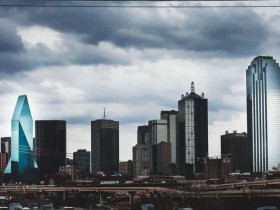
New Scientist, 11 May 2022
www.newscientist.com/article/2319455-circular-cities-experience-more-rain-than-square-or-triangular-ones/
The shape of a city can influence the amount of rainfall it gets, because circular cities are better at mixing air fronts together
READ ARTICLE AT New Scientist
Colorado conifers given ‘Fitbits’ to measure snow cover
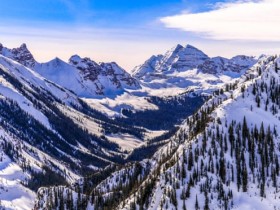
The Guardian, 5 May 2022
www.theguardian.com/news/2022/may/05/colorado-conifers-given-fitbits-to-measure-snow-cover
Calculating snow caught in trees by measuring their swaying is hoped to help monitor snowstorms
READ ARTICLE AT The Guardian
Massive underwater avalanches deliver pollutants to deep sea
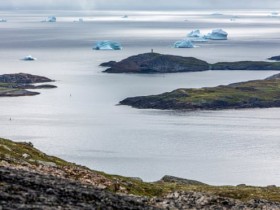
The Guardian, 27 April 2022
www.theguardian.com/science/2022/apr/27/massive-underwater-avalanches-deliver-pollutants-to-deep-sea
Research shows largest ‘turbidity currents’ can carry more sediment than the annual output of all the world’s rivers combined over time
READ ARTICLE AT The Guardian
Lightning-sparked forest fires set to increase in North America
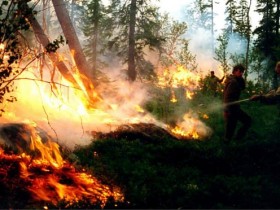
The Guardian, 14 April 2022
www.theguardian.com/news/2022/apr/14/lightning-sparked-forest-fires-set-to-increase-in-north-america
Weather conditions play huge role in which strikes start blazes in boreal forests of Canada and Alaska, research suggests
READ ARTICLE AT The Guardian
Terrawatch: Rare gas points to deep nebula origins for Earth

The Guardian, 9 April 2022
www.theguardian.com/science/2022/apr/09/terrawatch-rare-gas-deep-nebula-origins-earth-isotope-helium-big-bang
Most of rare isotope of helium found on mid-ocean ridges dates to big bang, providing clue to planet’s formation
READ ARTICLE AT The Guardian
When will the world reach 1.5C of global heating?
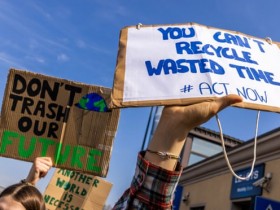
The Guardian, 5 April 2022
www.theguardian.com/environment/2022/apr/05/when-will-world-reach-global-heating-limit-ipcc-climate-crisis
With 1.5C of heating now all but inevitable, scientists say the focus must turn to mitigation measures
READ ARTICLE AT The Guardian
Europe faces a future of extreme droughts
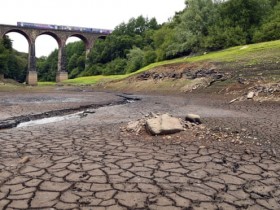
The Guardian, 1 April 2022
www.theguardian.com/news/2022/apr/01/europe-faces-a-future-of-extreme-droughts
Mitigation and adaptation measures are going to be crucial for future farming on the continent
READ ARTICLE AT The Guardian
Land of the Picts
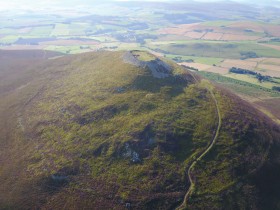
Archaeology Magazine, 1 September 2021
www.archaeology.org/issues/441-2109/letter-from/9932-scotland-picts
New excavations reveal the truth behind the legend of these fearsome northern warriors
READ ARTICLE AT Archaeology Magazine
Drop in pollution may bring hotter weather and heavier monsoons
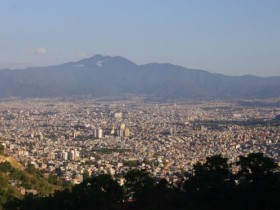
The Guardian, 13 May 2020
www.theguardian.com/world/2020/may/13/drop-in-pollution-may-bring-hotter-weather-and-heavier-monsoons
Scientists say fewer particles and polluting gases means more sunlight can reach Earth’s surface
READ ARTICLE AT The Guardian
Life in a carbon neutral world

Physics World, 2 April 2020
physicsworld.com/a/life-in-a-carbon-neutral-world/
Increasing numbers of cities and countries around the globe are pledging to become net carbon neutral within the next few decades. But what will day-to-day life look like in a “net-zero” world? Kate Ravilious looks at the changes that society will need to make
READ ARTICLE AT Physics World
Will spring slow spread of coronavirus in northern hemisphere?

The Guardian, 11 March 2020
www.theguardian.com/world/2020/mar/11/will-spring-slow-spread-of-coronavirus-in-northern-hemisphere
Will coronavirus infections slow down as spring arrives in the northern hemisphere?
READ ARTICLE AT The Guardian
Biomass energy: green or dirty?
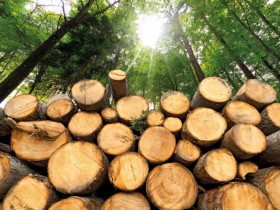
Physics World, 8 January 2020
physicsworld.com/a/biomass-energy-green-or-dirty/
The conversion to biomass energy has played a key role in reducing our dependence on fossil fuels. But is this renewable energy source really as green as we first thought? Kate Raviliousinvestigates
READ ARTICLE AT Physics World
Forget pristine habitats – for biodiversity save abandoned quarries
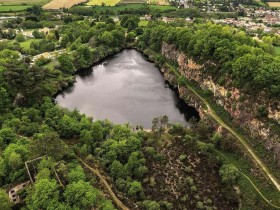
New Scientist, 4 September 2019
www.newscientist.com/article/mg24332460-700-forget-pristine-habitats-for-biodiversity-save-abandoned-quarries/
The best way to save Earth’s threatened wildlife could be to protect its most unglamorous and geologically diverse landscapes, from scrubland to exhausted mines
READ ARTICLE AT New Scientist
Italian earthquake data hint at possibility of forecasting one type of quake
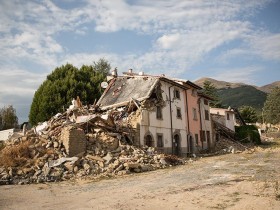
Nature, 23 October 2018
www.nature.com/articles/d41586-018-07017-5
Study suggests how ‘sequence’ quakes are constrained by their geology, which could allow scientists to forecast the large follow-up shakes.
READ ARTICLE AT Nature
The IPCC Special Report on Global Warming of 1.5 °C: the why, the what and the how
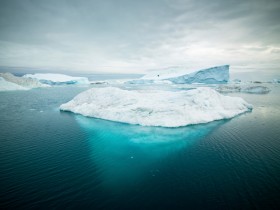
Physics World, 8 October 2018
physicsworld.com/a/the-ipcc-special-report-on-global-warming-of-1-5c-the-why-the-what-and-the-how/
Following the 1.5 °C aim agreed in Paris in 2015, the IPCC came together once more to assess the ramifications. Kate Ravilious investigates the background
READ ARTICLE AT Physics World
Thirty years of the IPCC
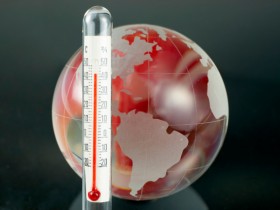
Physics World, 8 October 2018
physicsworld.com/a/thirty-years-of-the-ipcc/
The IPCC has achieved plenty since 1988, including winning a Nobel Peace Prize. Kate Ravilious reports on where it could focus now
READ ARTICLE AT Physics World
Weatherwatch: wind turbines in the sun, slow but steady
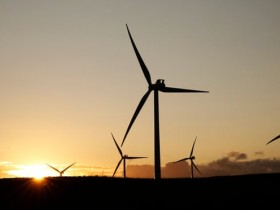
The Guardian, 8 October 2018
www.theguardian.com/news/2018/oct/08/weatherwatch-wind-turbines-in-the-sun-slow-but-steady
How did Britain’s wind power stand up to the record-breaking hot summer of 2018? Researchers look back over 38 years
READ ARTICLE AT The Guardian















